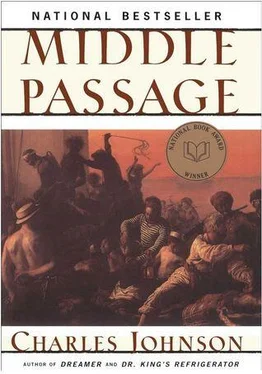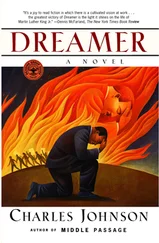Charles Johnson - Middle Passage
Здесь есть возможность читать онлайн «Charles Johnson - Middle Passage» весь текст электронной книги совершенно бесплатно (целиком полную версию без сокращений). В некоторых случаях можно слушать аудио, скачать через торрент в формате fb2 и присутствует краткое содержание. Год выпуска: 2012, Издательство: Scribner, Жанр: Современная проза, на английском языке. Описание произведения, (предисловие) а так же отзывы посетителей доступны на портале библиотеки ЛибКат.
- Название:Middle Passage
- Автор:
- Издательство:Scribner
- Жанр:
- Год:2012
- ISBN:нет данных
- Рейтинг книги:5 / 5. Голосов: 1
-
Избранное:Добавить в избранное
- Отзывы:
-
Ваша оценка:
- 100
- 1
- 2
- 3
- 4
- 5
Middle Passage: краткое содержание, описание и аннотация
Предлагаем к чтению аннотацию, описание, краткое содержание или предисловие (зависит от того, что написал сам автор книги «Middle Passage»). Если вы не нашли необходимую информацию о книге — напишите в комментариях, мы постараемся отыскать её.
a slave ship en route to collect members of a legendary African tribe, the Allmuseri. Thus begins a daring voyage of horror and self-discovery.
Peopled with vivid and unforgettable characters, nimble in its interplay of comedy and serious ideas, this dazzling modern classic is a perfect blend of the picaresque tale, historical romance, sea yarn, slave narrative, and philosophical novel.
Middle Passage — читать онлайн бесплатно полную книгу (весь текст) целиком
Ниже представлен текст книги, разбитый по страницам. Система сохранения места последней прочитанной страницы, позволяет с удобством читать онлайн бесплатно книгу «Middle Passage», без необходимости каждый раз заново искать на чём Вы остановились. Поставьте закладку, и сможете в любой момент перейти на страницу, на которой закончили чтение.
Интервал:
Закладка:
Between heaves, I said, “Illinois!”
A softening and a sort of pity came into Cringle’s voice. He withdrew his handkerchief, handed it to me, then watched as my belly turned inside out, like a shirt cuff. “But you’ll feel a lot worse if the skipper’s in a mood for cobbing. What on earth prompted you to stow away on a ship run by Ebenezer Falcon?”
“Debts,” I said, my eyes still swimming. “A woman. Maybe a jail sentence, or. . ”
Cringle smiled, and from out of his flash of even white teeth there flowered the relaxed, boyish grin, it struck me, of a young Presbyterian minister, or someone who’d grown up with a great deal of wealth, privileges, or personal gifts, and felt guilty about them in the presence of those who hadn’t: a man who’d maybe been a concert pianist at age five, or at twelve entered Harvard, or at fifteen solved some theoretical enigma in physics that had puzzled scientists twice his age, and who never spoke of these things without a touch of endearing humiliation because he hated not to be “regular,” yet who, it was clear, carried a core of aloneness within him that nothing on shore could touch. Cringle had, I was to learn, an almost psychotic total recall of everything he’d read. Had he been a woman — he certainly had a feminine air — he’d be the kind who could do Leibnizian logic or Ptolemaic astronomy but hid the fact in order not to frighten off suitors; or, if a slave, one who could bend spoons with his mind but didn’t so white people wouldn’t get panicky.
“Half the crew’s here for those reasons, or some other social failure on shore,” he laughed. “But I’ll tell you true: Jail’s better. Being on a ship is being in jail with the chance of being drowned to boot.”
“I can’t go back. .”
“None of us can. Come along. Maybe the captain can use someone in the galley. Can you cook?”
“Yes.”
“Liar,” said he. “Doesn’t matter, though. We’ve all gotten used to the taste of maggots in everything.”
At the captain’s door, which had three bullet holes in it, Cringle tried the latch. It was unbolted, but he decided against barging in and rapped instead, and a good thing this was, because from within the cabin, whose curtained windows were pulled shut, I heard the squeaking of mattress springs, then a stifled whimper, and at last a venereal moan so odd in its commingling of pleasure and complaint that I had, of a sudden, the vision of being not aboard ship but instead in a bordello. It made no sense then, those Venusian groans, that gasping yip of orgasmic stings, but soon enough it would. “Has he a woman aboard?” I looked to Cringle for an answer, but the mate wouldn’t look me in the eye; he chewed the inside of his cheek and politely pulled the door shut. “Didn’t I say this was worse than prison?” For another minute we stood waiting, looking at the door, at each other, and finally it opened and a heartbreakingly handsome cabin boy, with curly hair like wood shavings, young but hardly in long pants (and barely in these, for he was pulling up his striped duck pantaloons, tripping on the cuffs), came scrambling out, closing the door behind him, his jerkin unfastened, his face drained of color, and eyes crossed by what he’d been through.
“Good day to you, Mr. Cringle.” He kept his eyes low.
Cringle rubbed his face with one hand, peeking at the boy through his fingers.
“Are you and the captain finished, Tom?”
“Yessir. . I’m sorry, sir, you can go in now.”
The mate forced a smile that must have been harder to lift than a sledgehammer, looking down at the boy as you might a younger brother (or sister) you’d just glimpsed in a stranger’s set of pornographic pictures, pained by his shivering and rubbing his arms and standing bowlegged as if his bum was cemented shut by dried semen, as it probably was. Cringle tousled the boy’s hair, his lips tight, and moved Tom aside. “Tell Squibb”—his voice quivered—“I said he’s to fix you the finest meal he can, Tom.” And then to me: “Of course, you’ll say nothing of this to anyone.”
“Of course,” I said.
“It would not help morale, if the men knew. .”
“I’ve seen nothing,” I said, “but I wonder: Is my silence worth a word in my favor with the captain?”
His fingertips pushed the door inward. “Just go inside, Calhoun.” Ducking my head, I stepped down into a low-studded room, aware of Cringle’s breath and bodily warmth behind me, but of little else, for the cabin of Captain Falcon had the dank, ancient dampness of old ships, or a cave — that, and the clamlike, bacterial odor of tabooed pleasures. The air was denser inside, difficult for my throatpipes to draw. To my left, a small voice, like that of a genie in a jug, said, “Draw the curtains a bit, Mr. Cringle,” and when the mate did so, suddenly raying the room with bright light, a high-post bedstead with valances and knotted with dirty sheets sprang forth in the glare. Now I was rivering sweat. From the ceiling a pyramid-shaped poop lantern with horn windows swung low enough to crack your head, and to the right of that were a washbasin and clawfooted bathtub bolted to the floorboards — perhaps the only other landside luxury in the room. Across from these was a cluttered chart table. Seated at this, with his back to me, a big-shouldered man was barricaded in by maps of the sea and the African bush. On his table lay a gilded, ornamental Bible, a quadrant, chronometer, spyglass, and the log in which I now write (but this months later after mutiny and death, the reporting on which I must put off for a while). He kept to his business, refusing to turn, and said in that shocking voice thin and shrill and strung like catgut, “All right, stand at ease and state yer business.”
Cringle cleared his throat, coughing into one hand.
“We found this boy in the longboat, Skipper. He says he’s Rutherford Calhoun, a friend of Squibb. I thought perhaps—”
“You’ve rung the bell to change watch?”
The mate paused. “I was about to when I discovered th—”
“See to it, then. And shut the door behind you.”
The mate left, glancing helplessly at me. Standing alone, looking at the back of Captain Falcon’s sloping head, shining my boots on the back of my breeches to polish them, I thought that maybe racial savvy might see me through this interview. Maybe I shouldn’t say this, but we all know it anyway: namely, that a crafty Negro, a shrewd black strategist, can work a prospective white employer around, if he’s smart, by playing poor mouth, or greasing his guilt with a hard-luck story. At least it had always worked for me before. In my most plaintive voice I told the captain how desperate I was for work, that I’d stowed away because gainful employment was systematically denied black men back home, that New Orleans was so bigoted a Negro couldn’t even buy vanilla ice cream.
“So?” said Falcon.
I told him about my mother’s death from overwork in the fields of Illinois when I was three. (She died in bed, actually, but I could trade on this version and liked it better.)
“So?”
And then I related the hardships I’d received at the hands of my religiously stern master, Peleg Chandler, who gave all his slaves two teaspoons of castor oil every Saturday morning, whether they were sick or not, and called that “preventative medicine.” (It may not seem like much to you, but to me, at age twelve, it was torture.)
“So?” he said again, this time swiveling full around to face me, his elbows splashed on the leather arms of the chair, and as his gaze crossed mine in the crepuscular cabin light, as I saw his face, I felt skin at the nape of my neck tingling like when a marksman has you in his sights, because the master of the Republic, the man known for his daring exploits and subjugation of the colored races from Africa to the West Indies, was a dwarf. Well, perhaps not a true dwarf, but Ebenezer Falcon, I saw, was shorter even than the poor, buggered cabin boy Tom. Though his legs measured less than those of his chart table, Captain Falcon had a shoulder span like that of Santos, and between this knot of monstrously developed deltoids and latissimus dorsi a long head rose with an explosion of hair so black his face seemed dead in contrast: eye sockets like anthracite furnaces, medieval lines more complex than tracery on his maps, a nose slightly to one side, and a great bulging forehead that looked harder than whalebone, but intelligent too — a thinker’s brow, it was, the kind fantasy writers put on spacemen far ahead of us in science and philosophy. His belly was unspeakable. His hands, like roots. More remarkable, I’d seen drawings of this gnarled little man’s face before in newspapers in New Orleans, though I never paid them much attention, or noted the name. He was famous. In point of fact, infamous. That special breed of empire builder, explorer, and imperialist that sculptors loved to elongate, El Greco-like, in city park statues until they achieved Brobdingnagian proportions. He carried, I read, portraits of Pizarro and Magellan on every expedition he made.
Читать дальшеИнтервал:
Закладка:
Похожие книги на «Middle Passage»
Представляем Вашему вниманию похожие книги на «Middle Passage» списком для выбора. Мы отобрали схожую по названию и смыслу литературу в надежде предоставить читателям больше вариантов отыскать новые, интересные, ещё непрочитанные произведения.
Обсуждение, отзывы о книге «Middle Passage» и просто собственные мнения читателей. Оставьте ваши комментарии, напишите, что Вы думаете о произведении, его смысле или главных героях. Укажите что конкретно понравилось, а что нет, и почему Вы так считаете.












